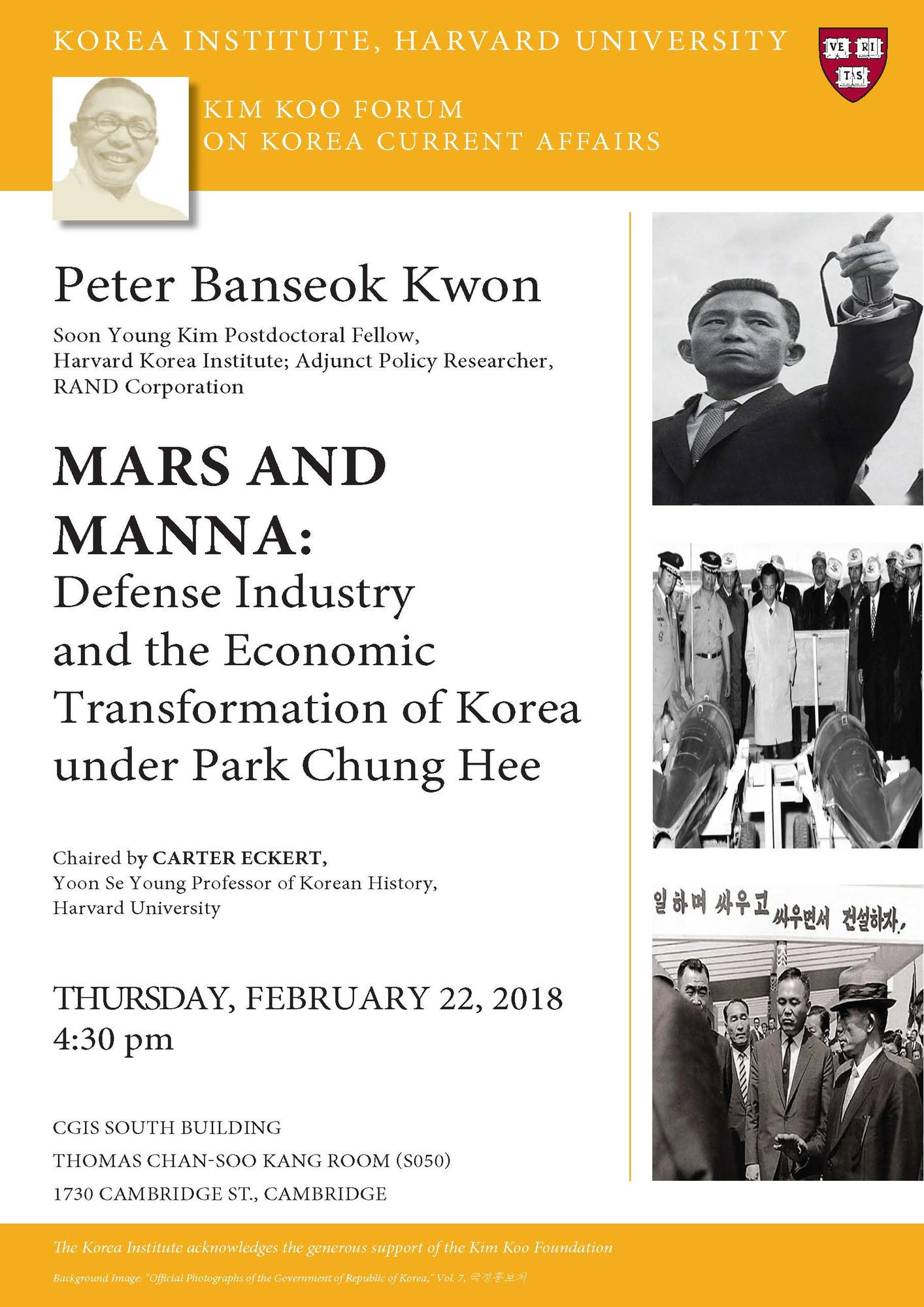Mars and Manna: Defense Industry and the Economic Transformation of Korea under Park Chung Hee Location:
Thomas Chan-Soo Kang Room (S050), CGIS South Building, 1730 Cambridge Street
Peter Banseok Kwon
Soon Young Kim Postdoctoral Fellow, Harvard Korea Institute; Adjunct Policy Researcher, RAND Corporation
Peter Banseok Kwon is the 2017-2018 Soon Young Kim Postdoctoral Fellow at the Korea Institute of Harvard
University
and
an adjunct policy researcher in the Department of Defense and Political Sciences (DPS) at RAND Corporation.
?Peter’s research and teaching interests relate to the historic role of the military and military-civilian relations in
shaping postcolonial Korean industrial, socio-economic and cultural transformation from 1945 to the present.
Peter earned his Ph.D. in History and East Asian Languages (modern Korean history) at Harvard University
in 2016.
His dissertation examines the Park Chung Hee regime’s (1961-1979) policy on ‘self-reliant national defense’
(chaju kukpang), as this policy orchestrated South Korea’s independent military modernization during the
Cold War.
For his research in Korea, Peter received support from the FLAS Fellowship from the US Department of Education,
the Pre-Doctoral Fellowship from the Academy of Korean Studies, and grants from the Harvard Korea Institute.
He was an Associate Researcher at the Institute of Korean Studies at Yonsei University, a visiting researcher
at the Kyujanggak Institute at Seoul National University, and a recipient of the 2017 AKS Junior Researcher
Fellowship. Peter is currently studying South Korea’s military modernization in relation to national business,
technological, and industrial development as well as transnational forces with the rise of arms industries in
developing nations during the Cold War period.
Chaired by Carter Eckert, Yoon Se Young Professor of Korean History, Harvard University
Abstract:
This study examines the role of the defense industry in South Korea’s rapid economic development,
often referred to as the “Miracle of the Han River,” under the Park Chung Hee administration (1961-1979).
In response to external threats posed by North Korea in tandem with US plans to withdraw troops from
South Korea in the 1970s, the Park administration integrated defense-related civilian industries into an
indigenous system of weapons production, as part of an overarching strategy to build a “self-reliant
national defense” (chaju kukpang). As the Park regime integrated civilian sectors into a comprehensive
public program of national defense development, the state tapped the private sector to supply infrastructure
for South Korea’s defense production, thus overcoming what were otherwise insufficient foundations for
the resulting industrial transformation.
I describe how Park’s Heavy and Chemical Industrialization (HCI; 1973-1979) policies remolded and
mobilized chaeb?l (Korean family-owned conglomerates) as state mercenaries for domestic arms
production through civilian manufacturing. A particularly Korean-styled military-industrial complex emerged,
as a military-civilian synergy spurred unprecedented development in both military and commercial production.
Thus South Korea’s defense industry was deeply intertwined with national economic development, reflecting
Park’s emphasis on independent economy as the foundation for national security, a principle encapsulated in
his slogan, “rich nation, strong military.”
The Korea Institute acknowledges the generous support of the Kim Koo Foundation.







